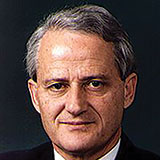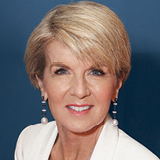My view about public life is that you need to have one objective, and that is to service the people who elect you. I went into public life and immediately suffered a 50 per cent pay cut. It’s not the most profitable field, but if you have a personal desire to serve, you can contribute significantly.
Many Australian politicians have legal backgrounds. Experts say lawyers are uniquely qualified for various roles in politics – as long as they use their powers for good.
Throughout Australia’s history, many lawyers have crossed over into politics. Our first prime minister, Sir Edmund Barton, was a judge. Sir Robert Menzies and John Howard, our two longest-serving prime ministers, were a barrister and solicitor respectively. Our first female prime minister, Julia Gillard, was a partner at Slater and Gordon. Malcolm Turnbull, our most recently deposed, made international headlines for his counsel in the 1987 “Spycatcher Trial”.
In fact, 11 of our 30 prime ministers have had legal backgrounds, but the influence of lawyers stretches beyond The Lodge. A paper from the Parliamentary Library called The 43rd Parliament: Traits and Trends shows that in 2013, more than 25 per cent of Labor and 20 per cent of Coalition parliamentarians had law degrees. About 13 per cent of the total had actually pursued legal careers prior to entering federal office.
Paul Strangio is a political historian and deputy head of the School of Social Sciences at Monash University in Melbourne. As far as Australian politics are concerned, he says legal qualifications have long been associated with representatives on the right. However, since Labor rose to power in 1972 under the leadership of former barrister Gough Whitlam, lawyers have also been appearing on the left with increasing frequency. The difference, he says, is because the ranks on the right have traditionally included greater numbers of professionals, while those on the left have featured more teachers, miners, railway employees, tradesmen and other unionised workers.
“Is [legal experience] an attribute? I think you can certainly argue that on face value, yes it is. As a parliamentarian, you’re in a legislative environment, so knowledge of the law is highly valuable. It trains you in the art, the skills, the scrutiny. You have advocacy skills and the ability to master a brief,” he says.
On the other side of the coin, he says there is concern over an increasingly homogenous government.
“The normative idea is that our representatives are representative of society as a whole. If any one profession dominates, that’s not a good thing. A concern about parliament over recent decades is the ‘professionalisation’ – the diversity of backgrounds has actually narrowed over time.”
However, Parliament has an adversarial process where one person acts to represent the interests of others – just like the courts. There is actually no evidence to suggest that, for example, a farmer is the best representative for pastoralists or a builder is the best representative for construction workers.
In that sense, lawyers are uniquely qualified for the role.

What makes a good politician?
Philip Ruddock is Australia’s second-longest-serving parliamentarian. The former lawyer started as an articled clerk at Sydney law firm Berne, Murray and Tout, where he worked his way up to partner.
Ruddock was elected to the House of Representatives in a 1973 by-election and served until he retired in 2016. Over the years, he wore a number of hats including Minister for Immigration and Multicultural Affairs, Minister for Reconciliation and Aboriginal and Torres Strait Islander Affairs, and Attorney-General.
Even now, the 76 year old hasn’t actually left public service. He is currently Mayor of Hornsby Shire in Sydney’s northern suburbs and he has been President of the NSW Liberal Party since 2017.
“My view about public life is that you need to have one objective, and that is to service the people who elect you,” he says.
“I went into public life and immediately suffered a 50 per cent pay cut. It’s not the most profitable field, but if you have a personal desire to serve, you can contribute significantly.”
He says the specific characteristics that make a politician successful depend on the individual, but in his case, the key was learning to be collaborative right from the get-go. In that respect, he says his legal experience did help to set him up for success – largely thanks to the partner he trained under.
Once, as a young lawyer, he lost a cheque before a major settlement. He tells LSJ he was “tremendously worried about it”, but thankfully by the time he got back to his office, the cheque had been found and the other firm had called to tell him to come back and complete the transaction.
“He knew I was very aggrieved and he said, ‘Next time, son, just remember to pin it to the file’. It says to me that you have to be willing to work with people, you have to be collaborative,” he says.
“I had a very successful relationship with people in the bureaucracy, not because I gave them orders, but because I invited them to help me achieve objectives I saw as being of fundamental importance. It’s the way in which you work with people that ultimately determines whether you are successful.”
 Philip Ruddock
Philip Ruddock
A different kind of race
It’s a cold, windy afternoon when Zali Steggall meets LSJ to talk about her recent election victory. Change is in the air – not just because of the season, but because of the new era she has begun in the seat of Warringah, on Sydney’s northern beaches.
The electorate was represented by former Prime Minister Tony Abbott for 25 years; he has been the local MP for every federal election of the 45-year-old Independent’s voting years. The athlete-turned-barrister will be sworn in and will attend her first sitting of Parliament this month. It marks the beginning of a new chapter in what is already an impressive book of achievements.
Steggall rose to fame as Australia’s first Winter Olympics individual medallist, and first female medallist, when she nabbed a bronze in alpine skiing at Nagano in 1998. She started her family while studying law, timing her pregnancies to fall in between exam periods, before becoming a reader. For the last decade, she has been practising family and commercial law at the NSW Bar.
She tells LSJ she enjoyed debating at school and exposure to the law through her father, a long-time solicitor in Manly, meant she always knew she eventually wanted to be an advocate.
“I always thought that being a barrister was very similar to my life as a skier. You’re under pressure to perform on the day, you know, you need to get it right but you’re only as good as the preparation you’ve put in. You need to be able to adjust and change depending on the circumstances.”
Steggall is polite but direct, and it’s clear she doesn’t waste time. Post-campaign, she’s been working flat out, simultaneously packing up her chambers and opening her electorate office. Now, as she sips a skim cappuccino, she reflects on the decision to run for office. She tells LSJ she believes there’s no such thing as bad decisions, just different choices that lead to different roads.
It was simply time to take on her next challenge, she says. She wasn’t fazed by the fact Tony Abbott was a formidable opponent. To her, the election was an opportunity to highlight issues she cares about and apply her advocacy skills on a larger scale.
“At the bar, especially in family law, you’re helping people in a time of need, when their lives are upside down and they need someone to help them find a solution. It’s a very intimidating process. I always thought of that in my role as counsel,” she says.
“Now my role is just to do that, but for the electorate. I’m not going to fix all the problems. I don’t have a magic wand – it doesn’t come with the job – but the promise you can make is to do your absolute best, to try and find solutions, and to be an advocate for the electorate.”
 Julie Bishop
Julie Bishop
I have seen, and witnessed and experienced, some appalling behaviour in Parliament. The kind of behaviour that 20 years ago, when I was a managing partner of a law firm of 200 employees, I would never have accepted.
Not an easy transition
Steggall will undoubtedly face challenges in her first few weeks of office this month, not least because of the contemporary political culture that has given Australia six prime ministers in the past 10 years.
In a speech at the Women’s Weekly Women of the Future Awards in Sydney last year, former Foreign Minister Julie Bishop spoke about her decision to resign as Deputy Leader of the Liberal Party and leave cabinet. Bishop, who previously worked as a partner at top-tier firm Clayton Utz in Perth, questioned whether an adversarial system really was the way to get the best out of Australia’s politicians.
“I have seen, and witnessed and experienced, some appalling behaviour in Parliament. The kind of behaviour that 20 years ago, when I was a managing partner of a law firm of 200 employees, I would never have accepted. Yet, in Parliament, it is the norm,” she told the audience.
Despite the challenges, however, Bishop concluded that it was worth the fight. Over the 20 years she held office, she was questioned time and time again about her decision to leave the law for politics, but she said her reason was simple.
“I was brought up to believe entering public office is one of the highest callings and that if you get the opportunity to dedicate your energy and your ability and your ideas to the betterment of your state or your country, then that was one of the greatest contributions you could make. I have always had an intense conviction that individuals can make a difference to the life of their times.”
Consensus building is everything
Labor frontbencher Penny Wong is another former lawyer who has risen up the political ranks. The South Australian senator practised law from 1996 until she entered politics in 2002.
Wong has held many senior positions, including Minister for Climate Change and Water, Minister for Finance and Deregulation, Shadow Minister for Trade and Investment, and Shadow Minister for Foreign Affairs. She is currently Leader of the Opposition in the Senate.
In March, she was awarded the University of Melbourne’s prestigious McKinnon Prize for Political Leadership for her work promoting tolerance and inclusivity and for her contributions to foreign policy.
“Many Australians feel that their political leaders are out of touch and that the political system is increasingly dysfunctional, incapable of addressing everyday concerns let alone longer-term challenges,” she said in her acceptance speech.
“We cannot continue to allow the adversarialism and competition of ideas that is intrinsic to democratic politics to mutate into the kind of hyper-partisanship and deep polarisation that can place democracy itself under stress. Such hyper-partisan approaches foreclose rational discussion and the willingness to listen to others and to build compromises.”
On this front, Steggall hopes the skills she honed as a lawyer will come in handy.
“Coming from the bar, most cases – whether commercial or family – require a mediation process. Everyone has their views, but you always try to find common ground. I do look forward to, I hope, bringing that skill and using it for the good of the whole of Australia,” she says.
“You can’t just govern for those who voted for you, you have to govern for everybody. That’s how we will progress. It has to be about finding common ground and then building
consensus where we can.”




